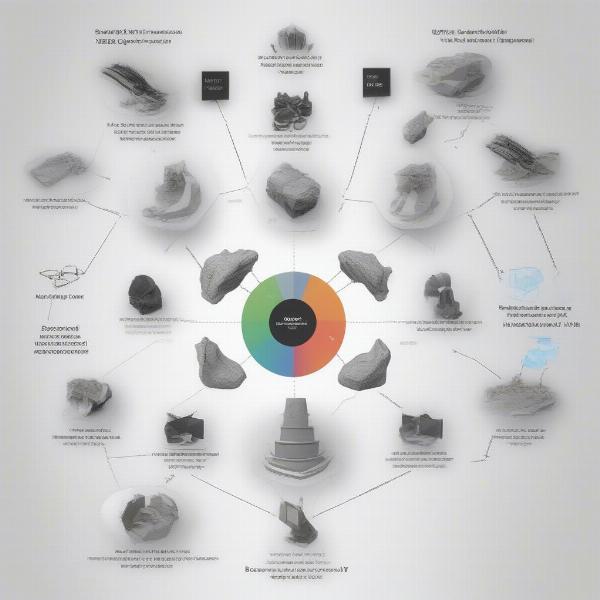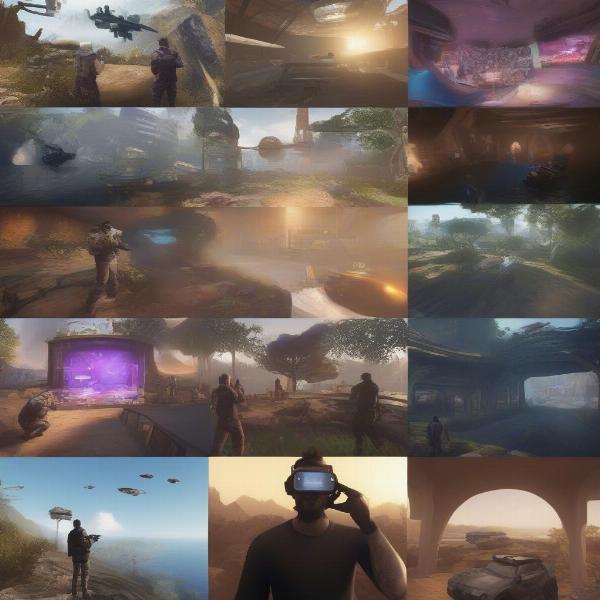Oculus games offer immersive virtual reality experiences, but how do they actually work? This deep dive explores the technology and principles behind Oculus games, unraveling the magic that transports you to other worlds.
After decades of science fiction dreams, virtual reality gaming has finally arrived, and Oculus headsets are at the forefront. But How Do Oculus Games Work, exactly? They blend cutting-edge hardware and sophisticated software to trick your senses into believing you’re somewhere else entirely. From the headset tracking your movements to the controllers becoming your virtual hands, there’s a fascinating interplay of technologies creating the illusion.
Understanding the Core Technology Behind Oculus Games
The heart of the Oculus experience lies in its ability to track your head and hand movements with incredible precision. This positional tracking is achieved through a combination of sensors, cameras, and sophisticated algorithms. As you move your head, the headset detects the changes in orientation and position, adjusting the virtual world accordingly. This allows you to look around a virtual environment just as you would in the real world. The controllers, equipped with similar tracking technology, translate your real-world hand movements into actions within the game. This is what allows you to reach out and interact with virtual objects, making the experience truly immersive.
Similar to considerations for choosing the right gaming platform, as discussed in how to play the games, Oculus games depend on a complex interplay of hardware and software. The headset’s display plays a crucial role, creating the 3D visuals that form the virtual world. Each eye sees a slightly different image, creating the illusion of depth and perspective. The refresh rate of the display, combined with the low latency of the system, is crucial for maintaining a smooth and believable experience, minimizing motion sickness. The audio system also plays a significant role, creating a spatial soundscape that further enhances the immersion.
![]() Oculus Headset Tracking System in Action
Oculus Headset Tracking System in Action
Decoding the Software that Powers Oculus Games
The software driving Oculus games is just as important as the hardware. Game developers utilize specialized software development kits (SDKs) provided by Oculus to create VR experiences. These SDKs provide tools and resources for creating 3D environments, integrating hand tracking, and optimizing performance for the Oculus platform. Developers also leverage game engines like Unity and Unreal Engine, which offer robust frameworks for building VR games. These engines provide physics engines, rendering pipelines, and other essential components that help bring virtual worlds to life. Optimization is key in VR game development, ensuring a smooth frame rate and minimizing latency to create a comfortable and immersive experience.
Have you ever wondered if you could get VR games without paying? Check out this insightful article on can you pirate vr games to understand the legal and ethical implications.
 The Process of Developing Games for Oculus
The Process of Developing Games for Oculus
How Oculus Games Interact with Your Senses
Oculus games are designed to trick your brain into believing you’re present in a virtual environment. They achieve this through a combination of visual, auditory, and sometimes even haptic feedback. The stereoscopic 3D visuals create the illusion of depth and space, while the spatial audio makes sounds appear to come from specific locations within the virtual world. Some games even incorporate haptic feedback, providing physical sensations through vibrations or force feedback, further enhancing the sense of realism.
Expert Insight: “The success of VR gaming relies heavily on how effectively it can deceive our senses,” says Dr. Emily Carter, a leading VR researcher. “By meticulously crafting the visual, auditory, and haptic elements, developers can create experiences that feel remarkably real.”
Exploring Different Types of Oculus Games
The Oculus platform boasts a diverse library of games spanning various genres. From action-packed shooters to relaxing puzzle games, there’s something for everyone. Many games are designed specifically for VR, taking advantage of the unique capabilities of the platform to offer experiences impossible to replicate on traditional gaming systems. Some popular genres include:
- Action/Adventure: Immerse yourself in thrilling adventures, battling enemies and exploring vast virtual landscapes.
- Simulation: Experience realistic simulations of everything from flying a plane to performing surgery.
- Puzzle/Strategy: Challenge your mind with intricate puzzles and strategic gameplay in virtual reality.
- Social/Multiplayer: Connect with friends and other players in shared virtual spaces, collaborating or competing in various activities.
Many gamers are curious about the compatibility between different VR systems. If you’re wondering about playing PlayStation VR games on your Oculus Quest 2, check out our guide on can you play ps5 vr games on oculus quest 2.
 Different Genres of Games Available on Oculus
Different Genres of Games Available on Oculus
The Future of Oculus Gaming
Oculus gaming is constantly evolving, with new technologies and innovations continually pushing the boundaries of what’s possible. Advancements in areas like eye tracking, haptic feedback, and wireless technology promise even more immersive and realistic VR experiences in the future. As the technology matures, we can expect to see even more compelling and groundbreaking games that blur the lines between the virtual and real worlds.
Expert Insight: “The future of Oculus gaming is incredibly exciting,” says David Miller, a veteran game developer. “With ongoing advancements in hardware and software, we’re on the cusp of a new era of truly transformative gaming experiences.”
Conclusion
Oculus games work by seamlessly integrating cutting-edge hardware and software to create immersive virtual reality experiences. From precise motion tracking to stunning 3D visuals and spatial audio, the technology works together to transport players to other worlds. As VR technology continues to advance, the future of Oculus gaming promises even more incredible and realistic experiences. So, dive in, explore, and discover the magic of virtual reality gaming!
FAQ
- What is the minimum PC requirement for Oculus games? Oculus has varying requirements depending on the game and headset. Check the specific game and headset specifications.
- Can I play Oculus games without a PC? Some Oculus headsets, like the Quest 2, can operate standalone, while others require a PC connection.
- How do I set up my Oculus headset? Follow the instructions provided with your Oculus headset for a step-by-step setup guide.
- What are some popular Oculus games? Popular titles include Beat Saber, Half-Life: Alyx, and Resident Evil 4 VR.
- Are Oculus games expensive? Prices vary depending on the game, with some free options and others costing comparable to traditional video games.
- Can I use Oculus for things other than gaming? Yes, Oculus can be used for various applications, including virtual tours, fitness programs, and social interaction.
- How do I maintain my Oculus headset? Clean the lenses regularly and store the headset in a safe place to prevent damage.

